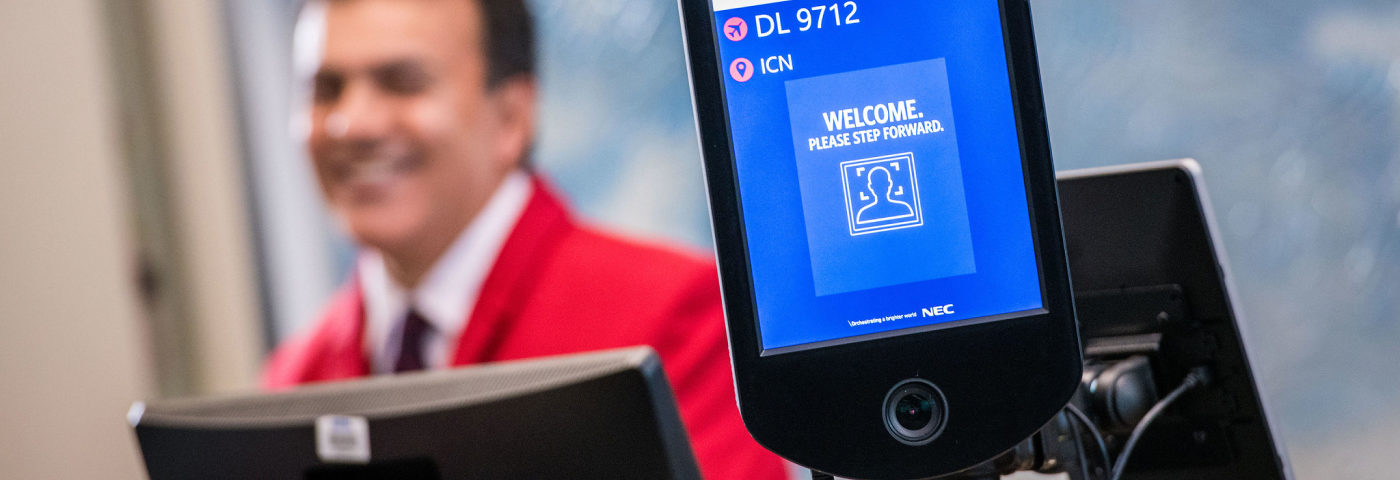We’ve come a long way since the advent of digital boarding passes on mobile phones. The rapid advancement of technology and the spread of COVID-19 has brought into focus how much is still left to be done.
An automated future
Travel operators, airports and airlines are embracing the possibilities that technology offers. Look no further than Delta, which as of December last year, is allowing customers travelling to international destinations to use facial recognition technology to board at Hartsfield-Jackson Atlanta, Minneapolis-Saint Paul and Salt Lake City international airports.
Delta states that 72% of customers prefer facial recognition to standard boarding in Atlanta. Launched in 2018, this was the first curb-to-gate biometric terminal in the USA.
“We are already seeing improvements in satisfaction scores from customers moving through the airport in Atlanta,” says Gil West, Delta’s COO, adding: “The expansion of facial recognition at boarding enables more customers to take advantage of these seamless, time-saving processes – an important step as we implement facial recognition at our hubs across the country and define the experience for the industry.”
“The expansion of facial recognition at boarding enables more customers to take advantage of these seamless, time-saving processes…”
Keeping distance
These digital initiatives are only going to increase with new social distancing measures set to become a daily reality following the spread of COVID-19.
Other tech developments for Delta include a self-service biometric bag drop for international passengers at Minneapolis airport and biometric check-in for all domestic Delta Sky Clubs.
Perhaps more interestingly is Delta’s investment in autonomous vehicle research, which it announced in October 2019. West continued: “Driving the leading edge of emerging technology – like we have done with biometrics by launching the first fully biometric terminal in the United States – means Delta can help shape how the industry adopts it.
“Autonomous vehicle technology is one of those innovations we see as having the potential to improve employee safety, the customer experience and operational performance”, states West.
Apps for every part of the journey
In 2018, London Gatwick airport launched a new app and cloud-based Flight Information System (FIDS). They both are part of the airport’s ‘digital transformation’ programme, that includes personalised, real-time flight updates, gate information and check-in and security queue times straight to travellers’ phones. It also provides intuitive maps that guide passengers through the airport using some 2,000 navigation beacons located within the terminal buildings.
Technology has plenty of operational benefits for operators and passengers while also helping to boost revenues too. For instance, insight from global data and research specialist Nielsen says AR will transform brand engagement when it comes to retail. It says in a study, global consumers listed A/VR as the top technology they are seeking out to assist, amplify and augment their daily lives.
“Companies will have the tools to virtually replicate the physical instances of shopping, while also eliminating many of the obstacles. This will enable them to reach out to consumers where they are, with informative, personalised and compelling experience,” says John Tavolieri, Nielsen’s Chief Product & Technology Officer, Nielsen Global Connect.
A new reality
Augmented Reality (AR) and Virtual Reality (VR) are also cited by Venari Partners, a specialist executive search firm working with airlines, as growing in importance for travel operators. It points to AR on board the Airbus A380, which allows passengers to use it to take a 360﮿ virtual tour of the flight deck and tours of passing landmarks.
Venari Partners also says inflight connectivity (IFC) not only offers passengers greater convenience, but is also driving new business partnerships with companies such as Amazon Prime and Netflix.
It also points to how airlines can use it to upsell once passengers are onboard: “A great example of IFC can be found on Finnair. Their main ancillary revenue source derives from food & beverage and upgrade sales, which are promoted throughout their free inflight ‘Nordic Sky Wi-Fi’ and Inflight Entertainment System.”
On the ground innovations
On a lighter, but lucrative note, British Airways recently announced it is now offering Artificial Intelligence-powered cocktail mixing at New York Newark and San Francisco International airports. BA is the first airline to trial the technology from Barsys, that sees customers order from a selection of 30 cocktails, place their glass on the conveyor belt and let the AI do the rest.
Another major catering innovator is Yaos, a technology start-up that specialises in airline catering software. Based in Zurich, Switzerland, Yaos produces LimeFlight, a state-of-the-art inflight catering suite based on machine learning technology. The software is currently being used by major European airlines because it offers unseen optimisation possibilities and automates far more complex tasks than traditional software. With the need to be flexible with catering supplies, solutions like this are bound to increase.
The future is now
The COVID-19 pandemic has accelerated the need for new digital solutions. As we all get used to social distancing and the need to be touchless, innovative options will provide an improved, and safer experience for all staff and travellers.
Header image from Delta. The image has been cropped from the original size.

